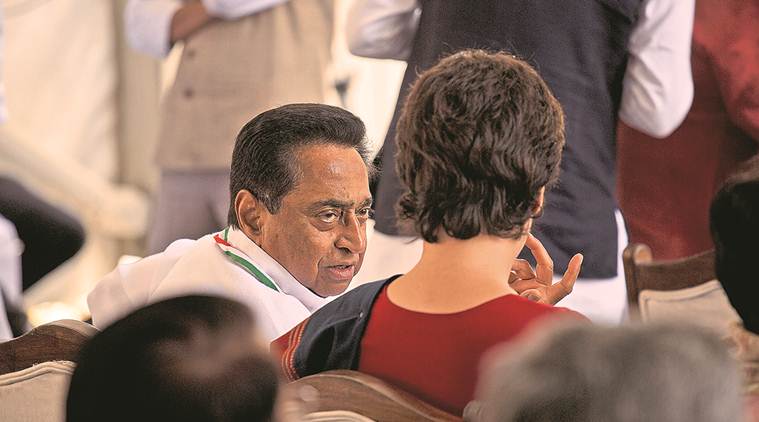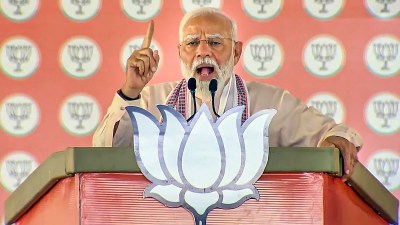- India
- International
In MP, Congress challenge: Just three months for delivery — and Modi
For the Congress, which won six of the eight Assembly segments in Rajgarh — wresting three from the BJP — time hasn’t been an ally.
 In an interview to The Indian Express on Monday, Chief Minister Kamal Nath had said loans to the tune of about Rs 12,000 crore have been waived for about 21 lakh farmers out of a total 50 lakh farmers in the state. (AP)
In an interview to The Indian Express on Monday, Chief Minister Kamal Nath had said loans to the tune of about Rs 12,000 crore have been waived for about 21 lakh farmers out of a total 50 lakh farmers in the state. (AP)
“Yeh chunaav toh Modiji ka hai, baaki kuch nahi (Modi is the only issue in this election, nothing else),” says Mangilal Dangi, 36, a farmer who grows wheat and soya beans in his six-bigha plot (one bigha is one-third of an acre) in Khilchipur nagar panchayat. Sitting in a large group, gathered in the middle of the town for evening snacks and tea, he speaks up when a bigger farmer Sajjan Singh, who turns out to be a Congress functionary, predicts his party candidate’s victory in Rajgarh Lok Sabha constituency.
Mangilal counters all that Sajjan Singh, who holds up to 40 bighas, claimed about higher farm produce prices in mandis since Congress’s return to power in Madhya Pradesh in December 2018. “Pappu nay bola 10 din mein karja maaf.hua kay (Pappu said loans will be waived in 10 days. Has it happened)?” he asks.
Lok Sabha Elections 2019: Polling schedule, results date, constituency-wise results, how to check live counting of votes
Singh, 36, who belongs to the Sondhiya samaaj — the largest community in Rajgarh — says the loan waiver of Rs 2 lakh announced by Kamal Nath will happen for sure. “Abhi toh aachaar samhita laga hai (The model code of conduct is in place now),” he points out.
He has Rs 2.5 lakh outstanding in bank loans and about Rs 50,000 with the cooperative society. Mangilal says during Shivraj Singh’s (former Chief Minister’s) term, farmers got deposits into their bank accounts regularly, be it crop insurance or compensation for crop loss.

Besides this, he has many more things, including national security, in mind. Juxtaposing the two personalities – Congress President Rahul Gandhi and Prime Minister Narendra Modi – and holding them to account for what they said in public, Mangilal says, “Pappu (a reference to Rahul) toh Masood Azhar ‘ji’ kaho, usko samman diyo. woh toh uskay saath miley hain (Rahul gives respect to Masood Azhar, he bonds with him),” he says referring to a Whatsapp video in his mobile. “Modi ji toh Pakistan mein ghus ke 250-300 ko maarein hai (Modi ji forcibly entered Pakistan and hit it),” he says.
The verbal duel continues with Sajjan Singh retorting, “Yes, as if he (Mangilal) was there to witness the attack. We all know that just about a crow died after this.”
Mangilal isn’t the only one, many farmers in Rajgarh district have not received the waiver promised by the Congress ahead of Vidhan Sabha elections; instead Chief Minister Kamal Nath has sent a text message to them saying the state could not repay their loans since the Model Code of Conduct has kicked in and they would be waived immediately after elections.
Also Read | Kamal Nath: ‘If not Modi, they’ll back anyone… there is a BJP base… But not enough to win’
Forwarding Kamal Nath’s text, Sarjan Singh, who has about 30 acres in Berasiya village, off the Bhopal Road along NH 46, says: “Koi nahi vishwaas kare. aap pooch lijiye, kisi kisan ka karja maaf nahi hua hai (Nobody believes it, you can ask any farmer).”
In an interview to The Indian Express on Monday, Chief Minister Kamal Nath had said loans to the tune of about Rs 12,000 crore have been waived for about 21 lakh farmers out of a total 50 lakh farmers in the state. State government officials in Rajgarh said, of the 1.8 lakh farmers in the district, around 42,000 (less than a third) had benefited from the waiver so far.
For the Congress, which won six of the eight Assembly segments in Rajgarh — wresting three from the BJP — time hasn’t been an ally. It got barely three months between taking charge in December before the model code of conduct kicked in. Result: many of its assurances are on hold prompting impatience and some cynicism.
So, according to Sarjan Singh, freebies do not work and is sceptical of Rahul Gandhi’s promise of Rs 72,000. “Ghar baithe khilaoge toh desh barbaad hoga (If you feed a person without work, you will destroy the nation),” he says. A farmer needs water, support for inputs, and a good price for his produce, and not any dole. “Shivraj kay time mein paani ka connection mila. Har khet mein mandi lagi (During Shivraj’s time, farmers got water connection, and markets were set up closer to farms),” he said.
Big farmers like Naresh Kumar Meena, with 50 acres, compare sustained work of Shivraj Singh over 15 years against five months of Kamal Nath’s and amplify the setbacks. “Bonus hasn’t come. Wheat is selling at Rs 1,840 a quintal in the market. Farm loan hasn’t been waived. I have faced crop loss of Rs 5 lakh,” he says.
But the smallest farmers, many being Dalits, have been the worst hit in the region, which struggles even for drinking water, let alone its availability for agriculture. In Sonkhej village, which is part of the Narsinghgarh tehsil, Dalit farmers with very small land parcels of 2-3 bighas, either work for big farmers, or undertake labour outside their panchayat.
“There are around 50 Dalit households in this village. Not one has a tubewell,” says Madanlal, 60, a Dalit farmer, who has four bighas and a debt of about Rs 15,000. “Panchayat sey koi kaam hee nahi miley (Panchayat doesn’t provide any work),” he says. Madanlal works as a labourer for someone else. For every bigha he helps harvest, he gets 80 kg of wheat. Every Dalit home has about 8-10 mouths to feed, he says.
For Madanlal, the choice is either to do this or step out of the village to work as a daily labourer to earn Rs 300 a day. “There has been no work available under MNREGA during the last couple of years,” says Mangilal, a Dalit farmer who was the village’s sarpanch in 2004-05, adding NREGA fetches only Rs 168 a day compared with Rs 300 a day that one can earn by providing majdoori outside the village.
Few people in Sonkhej’s Dalit basti have heard of NYAY scheme for the poorest announced in Congress’s manifesto. “There was some talk of the patwari taking down the names of all poor in the village. What is the scheme about?” asks Rajender Jangariya, who runs a puncture shop in the basti.
Prem Narayan Jangariya, 28, also of Sonkhej, and a Dalit, feels betrayed that Rajgarh’s Congress Lok Sabha candidate Mona Sustani did not attend his sister Sulochana’s wedding ceremony on April 25. “Face-to-face patrika diya tha.(I had personally invited her),” he says. Had she come, parmatma (God) would have descended upon our jhopad (hut), he adds.
Prem Narayan is hurt but says, “I will still vote for the Congress. It’s only under the Congress government (that) we get any government job.” A landless Dalit, he is a daily wage labourer and has four children, the eldest a nine-year old daughter who goes to the government school in the village. “Both my grandfather and father received small parcels of land by Congress governments in the past, but had to sell due to family exigencies,” he says.
There is little to no economic activity besides farming in water-starved Rajgarh. Many infrastructure activities including road widening, dam building and laying of water pipelines are currently underway, which provides labour opportunities for the illiterate and poor in the village. On either side of National Highway 46 from Bhopal to Rajgarh, vast tracts of land dry and barren after the wheat crop, are now waiting for monsoon so that farmers can sow their second crop of the year, soya beans.
In Khujner village, part of Rajgarh tehsil, Sher Asif, 40, says demonetization and GST have dealt a big blow to small businesses like his. Asif sells batteries and runs a mechanic shop just outside Manglik Bhawan, which witnessed a Hindu-Muslim incident during the Republic Day celebrations on January 26. “Koi danga nahi hua, bachhon kay beech jhagda hua, aur kuch musalmanon par desh droh ka charge laga diya (There was no riot. Some altercation between school children was blown out of proportion and sedition charges were slapped on some Muslim boys),” he says.
Two of his own children were inside the hall, Asif says, adding Khujner did not witness any Hindu-Muslim riots since 1993. Concurs Kamlesh Kirad, 36, who belongs to the same community as Shivraj Singh, and resides in Limboda village, 8 km from Khujner. At the shop to buy a battery for a passenger transport vehicle, Kamlesh says, “I would still give my vehicle for any function at Asif bhai’s, although many villagers in Limboda have made representations that Hindus should not have any relationships with Muslims after the incident. Yehi rajneeti hai (This is what politics is all about),” he says.
Apr 25: Latest News
- 01
- 02
- 03
- 04
- 05








































